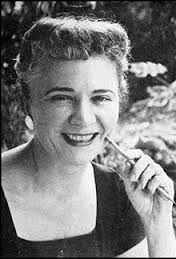Today, December 7, is the birthday of Leigh Brackett (1915-1978). That’s big deal here.
 For today’s birthday post, I’m going to look at “The Beast-Jewel of Mars”. It was first published in the Winter 1948 issue of Planet Stories. It is currently available in the ebook Martian Quest (not to be confused with the omnibus of the same name from Haffner Press. That one is out of print. Amazon lists one copy of the Haffner volume for $256.)
For today’s birthday post, I’m going to look at “The Beast-Jewel of Mars”. It was first published in the Winter 1948 issue of Planet Stories. It is currently available in the ebook Martian Quest (not to be confused with the omnibus of the same name from Haffner Press. That one is out of print. Amazon lists one copy of the Haffner volume for $256.)
Burk Winters is a spaceship captain who has resigned. His fiance, Jill Leland, took a flier out into the desert. Her flier was found crashed, but her body is missing. He’s going to look for her. Burk has an unusual plan to do that.
There’s a Martian practice known as Shanga, the going-back. In it a person regresses to a more primitive state. It’s like a legalized drug. There are Shanga parlors, sort of like opium dens, but the experience is weak. Burk wants the full experience, which is technically illegal. Jill was a Shanga addict, and Burk is hoping to find her.
Here’s how Brackett describes what Burk sees when he goes to a Shanga parlor.
Their faces (the Earthmen’s) were pallid and effeminate, scored with the haggard marks of life lived under the driving tension of a super-modren age.
A Martian woman sat in an alcove, behind a glassite desk. She was dark, sophisticatedly lovely. Her costume was the aftfully adapted short rove of ancient Mars, and she wore no ornament. Her slanting topaz eyes regarded Burk Winters with professional plesantness, but deep in them he could see the scorn and the pride of a race so old that the Terran exquisites of the Trade Cities were only crude children beside it.
Burk goes to an ancient city on a canal, a city that was once a port on an ancient sea, now long dry. There he undergoes Shanga, and he finds a lot more than he bargains for.

Leigh Brackett
One of the pleasures of reading Brackett is that, like REH, she could describe action with poetry. She can set a mood with a few lines of description like few writers can. There is a strong undercurrent of anti-colonialism in this story. That’s something of a trend today in what’s being currently written. Brackett shows the effects of colonialism in this story, and she didn’t need a doorstop of a book to do it. And she does it without neglecting character or action.
Burk is like many of Brackett’s characters. He’s a hard, bitter man who is looking for a lost love. This is a theme that crops up often in Brackett’s work, and in her hands, it’s always fresh.
I found “The Beast-Jewel of Mars” to be an excellent story. I’m not going to give the ending away. I’ll let you read it for yourself. There’s something about Brackett’s work that speaks to me deep in my soul. Yeah, I know, that sounds pretty deep. But her work scratches an itch that few other writers can. You should check her out if you haven’t yet.
 Today is December 7, and that means it’s the birthday of Leigh Brackett (1915-1978).
Today is December 7, and that means it’s the birthday of Leigh Brackett (1915-1978).





